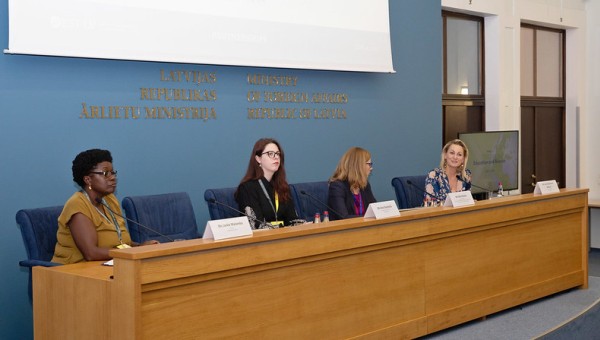Engage Your Target Audience: Business Communications Professor Michèle Favorite

Professor Michèle Favorite
Born and raised in Naples, Professor Michèle Favorite attended Brown University in the United States before continuing her studies in the United Kingdom. She holds a Ph.D. in International Relations from the University of Oxford.
What brought you to Rome and John Cabot?
After so many years of academia, I figured I had better get some understanding of the real world, and I chose to do a crash course in business by going into management consulting. Boy, was that ever a crash course! I was exposed to multiple industries, markets, countries, all at the same time, and loved it. I really recommend it to students who want to get a good feel for the business world from many different angles.
And then came a job offer I couldn’t refuse. I came to Rome because I started working for ENI, the Italian oil and gas company. I started off as the Assistant to the Director of External Relations, which was the biggest department at ENI and covered everything from advertising to government relations, served as speechwriter to the CEO, and ended up as Head of Foreign Media. That was one of the most fun and demanding jobs I have ever had. Managing the company’s image and reputation in 66 companies was fascinating, and hard work. We had plenty of crises and emergencies all over the world, including Nigeria and Egypt.
What is your teaching philosophy?
Every student has something special and it is a good teacher’s responsibility to bring out that special trait.
Please tell us about a challenge you encountered in your teaching career. How were you able to overcome it?
One of my first challenges was establishing my authority in the classroom. One of my very first classes was made up of a group of very rowdy guys, and they could sense my uncertainty. So they had a ball with it. I slowly grew into my role by relaxing and being myself.
What is the biggest NO-NO in Business Communications?
One of the biggest is not focusing on your audience. The best communication is audience-centered. This means you have to know who your audience is and understand what will engage it. This is at the base of creating communication that is authentic, persuasive, effective. Most people communicate as if they were the most important player in the communication. Getting students to make this mind shift is really rewarding.
Today, we tend to commercialize everything: knowledge, skills, talent. We think about people and things in terms of economic value and “usefulness,” and if we cannot profit from them in the short term, we disregard them. What is your take on this?
You’re right, but I think there are some encouraging signs that things are starting to change. We are learning the hard way that short-term gains can be harmful and myopic. Look at the environmental crisis. That is the result of a short-term profit-driven vision that completely disregards the long-term effects on the environment. We are starting to realize how dangerous that is and how we need to take a much longer view.
Businesses are also starting to change. They understand that their well-being is closely related with that of their stakeholders at large, not only their shareholders, and stakeholders are making companies increasingly accountable for their social, environmental and governance behavior.
What characteristics do innovative companies most look for in their employees and how can one demonstrate to have them?
Innovative companies are dynamic and forward-looking. They are looking for talent that can thrive in a constantly changing environment, that is able to manage uncertainty, that can handle multiple projects at the same time and that is comfortable with diversity. These are all soft skills. So, in a nutshell, besides having a good grounding in the core academic subjects, young people need to have strong soft skills. A liberal arts education is a great way of combining these.
Professor Michèle Favorite will teach Business Communications and Public Relations in Spring 2021.





